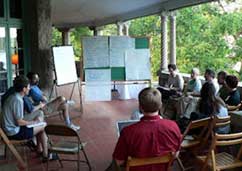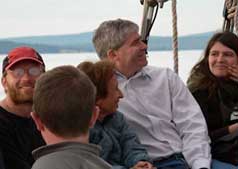PER and TA Preparation
MacKenzie Stetzer
Working Group Members: Delores Alber, Katrina Black, Andrew Boudreaux, Warren Christensen, Carol Koleci, Andy Elby, Jerry Feldman, Renee Michelle Goertzen, Mila Kryjevskaia, Cedric Linder, and Peter Shaffer.
 The Working Group on PER and TA Preparation was given the task of identifying and broadly defining areas of research related to TA preparation that might be investigated by the physics education research (PER) community. Due to the wide variety of contexts in which TAs are expected to teach (traditional laboratories and recitation sections, collaborative problem solving sessions, tutorials, etc.), it became clear that it would not be practical to seek a consensus on a single, universally applicable model for TA preparation. The Group therefore chose to limit the context of the discussion to that of graduate and undergraduate TAs teaching in small group sections using reformed PER-based curricula. The goal was to identify broad themes of research with the potential to inform TA preparation in this particular context.
The Working Group on PER and TA Preparation was given the task of identifying and broadly defining areas of research related to TA preparation that might be investigated by the physics education research (PER) community. Due to the wide variety of contexts in which TAs are expected to teach (traditional laboratories and recitation sections, collaborative problem solving sessions, tutorials, etc.), it became clear that it would not be practical to seek a consensus on a single, universally applicable model for TA preparation. The Group therefore chose to limit the context of the discussion to that of graduate and undergraduate TAs teaching in small group sections using reformed PER-based curricula. The goal was to identify broad themes of research with the potential to inform TA preparation in this particular context.
The general strategy of the Working Group was to begin by identifying TA practices and characteristics consistent with results from research on student learning. These would, in turn, be used to help identify the desired outcomes of TA preparation. The research questions that the Group proposed were closely related to these outcomes. It was anticipated that the findings from such research would be of use in refining notions of TA best practices and desired TA preparation outcomes, and would have implications for the design and practical implementation of TA preparation programs. (The focus of the Working Group, however, was not on the details of implementation.)
Common vision of TA best practices and characteristics
After considerable discussion, the Working Group arrived at what it felt constituted a provisional list of TA best practices and characteristics. These were grouped into three broad categories: (1) knowledge and skills associated with physics content, (2) nature of interactions with students, and (3) metacognitive skills. The list generated and refined by the Group is outlined below.
Knowledge and skills associated with physics content
The TA should possess a deep understanding of or facility with the following:
- Subject-matter content
- Pedagogical content knowledge
- Common student ideas, difficulties, and resources
- Nature of science
- Relevant scientific process skills (e.g., proportional reasoning)
- Critical thinking
- Epistemological goals of the course
- Representations and conventions of the course
Nature of interactions with students
During instruction, a TA’s commitment to constructivist epistemology should be reflected in his or her interactions with students. The TA should:
- Not assume a traditional authority role, but rather be both approachable and professional
- Attend to both answers and reasoning, and listen for both substance and correctness
- Be attentive to student behavior, level of engagement, and emotional state; “listening” to both verbal and non-verbal communication and also knowing when to leave a group
- Practice formative assessment through effective questioning
- Recognize the difference between surface-level understanding and deep understanding
- Choose appropriate step sizes when guiding students
- Attend to intragroup variability and foster appropriate group dynamics
- Manage available time and resources, and set priorities as necessary (i.e., be able to apply triage)
- Inculcate attitudes, critical thinking skills, etc., including the capacity for self-directed learning
- Hear student complaints with thoughtful respect while maintaining course integrity
- Advance student thinking beyond the specified curriculum when appropriate
Metacognitive skills
The TA should be comfortable with and well practiced in:
- Reflecting on his or her own learning
- Reflecting on his or her own teaching
Desired outcomes of TA preparation and implications for areas of research
The above list of best practices and characteristics of TAs guided the Working Group’s reflections on the desired outcomes of TA preparation. The Group argued that an effective TA preparation program should (1) build capacity for TA best practices, (2) engender among TAs favorable attitudes toward research-based curricula and reformed instruction, and (3) help improve student conceptual understanding and attitudes. (Note that the first two outcomes focus on the TAs, whereas the third outcome highlights the impact on students in the course.) While this list is tentative and certainly not exhaustive, it served to define, in a natural way, three different strands of research that might be pursued by physics education researchers in the context of TA preparation.
Existing research base on TA preparation
 While much of the research on teacher preparation and professional development has implications for TA preparation, the Working Group noted that, to date, the physics education research community has not yet produced an extensive research base on TA preparation. Most published studies have focused on TA best practices, including investigations of TA content knowledge and student-TA interactions [1]. One recent study by Koenig et al. is notable in that it probes both best practices and the impact of those practices on student conceptual understanding [2]. Ongoing research on TA preparation is being conducted at several different institutions, including the University of Colorado at Boulder, the University of Maryland, and the University of Washington. During Group discussions, however, it became clear that considerably more work needs to be done before truly research-based TA preparation programs can be developed.
While much of the research on teacher preparation and professional development has implications for TA preparation, the Working Group noted that, to date, the physics education research community has not yet produced an extensive research base on TA preparation. Most published studies have focused on TA best practices, including investigations of TA content knowledge and student-TA interactions [1]. One recent study by Koenig et al. is notable in that it probes both best practices and the impact of those practices on student conceptual understanding [2]. Ongoing research on TA preparation is being conducted at several different institutions, including the University of Colorado at Boulder, the University of Maryland, and the University of Washington. During Group discussions, however, it became clear that considerably more work needs to be done before truly research-based TA preparation programs can be developed.
Open research questions
For each broad area of research on TA preparation, the Working Group sought to identify several research questions that were both illustrative of the area and critical for gaining greater insight into TA preparation. Specific examples of questions posed by the Group are given below.
Research emphasis on capacity for TA best practices
- What productive resources (e.g., epistemological and content-based) do TAs already possess? What deficits do they seem to have?
- To what extent does TA preparation affect TA capacities and skills?
- To what extent do specific TA best practices affect student learning and development?
- To what extent does the graduate student environment affect TA practices?
Research emphasis on favorable attitudes to reformed instruction
- To what extent do TAs who have participated in a TA preparation program apply the same methods and instructional approaches to subsequent graduate TA assignments?
- To what extent do TAs who have participated in a TA preparation program adopt the same methods and instructional approaches if and when they become faculty?
- To what extent does familiarity with relevant PER literature influence TA behavior?
- Does the experience of learning via reformed instruction as an undergraduate influence subsequent graduate TA teaching practices?
- Does the amount of time it takes for a new graduate TA to recognize the value of reformed instruction influence his or her future teaching practices?
Research emphasis on student conceptual understanding and attitudes
- How dependent on the TA are the gains in student conceptual understanding and/or attitudes resulting from research-based instructional materials?
- Are there certain topics for which student learning is more dependent on specific student-TA interactions (and thus more instructor dependent)?
- How does the graduate school environment in which a TA is situated affect the learning of his or her students?
These are a small sample of the types of questions the Group felt would be both intellectually engaging and of considerable value to the broader physics community. Findings from investigations pursuing such research questions could have significant impact on the types of TA preparation advocated and offered by the physics education research community.
Conclusions
The general consensus of the Working Group was that more research in the area of TA preparation is needed in order to help the PER community refine and sharpen its notions of TA best practices and desired outcomes of TA preparation. Specific findings are required in order to guide the development of TA preparation programs that have a documented effect on TA behavior and student learning. On the basis of Working Group discussions and the large number of research questions the Group identified, it is clear that the area of TA preparation promises to be a rich field of inquiry for members of the physics education research community.
Acknowledgements
The author, as facilitator of the Working Group, would like to thank all of the other members of the Group for their insights, thoughtful comments, and substantive contributions.
References
1. See, for example: T. O’Brien Pride, S. Vokos, and L. C. McDermott,“The challenge of matching learning assessments to teaching goals: An example from the work-energy and impulse-momentum theorems,” Am. J. Phys 66 (2), 147 (1998) and R. E. Scherr, R. S. Russ, T. J. Bing, and R. A. Hodges, “Initiation of student-TA interactions in tutorials,”Phys. Rev. ST Phys. Educ. Res. 2, 020108 (2006).
2. K. M. Koenig, R. J. Endorf, and G. A. Braun, “Effectiveness of different tutorial recitation teaching methods and its implication for TA training,”Phys. Rev. ST Phys. Educ. Res. 3, 010104 (2007).
MacKenzie Stetzer is a Research Assistant Professor with the Physics Education Group in the Department of Physics at the University of Washington.
